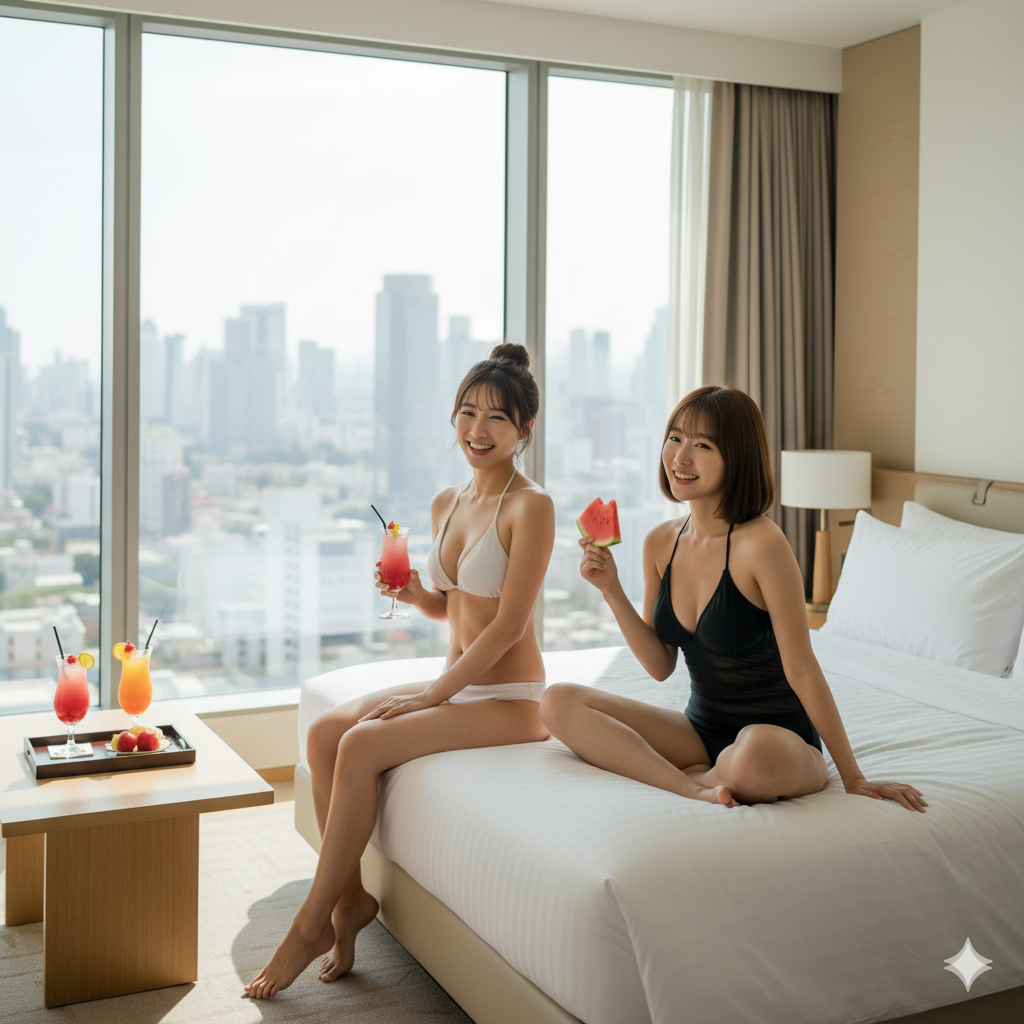In Tokyo’s night districts, spaces of “performed intimacy” range from loud lounges to quiet private booths. Dating cafés (deai café) separate genders until a staff-mediated chat; aiseki lounges seat men and women at shared tables; hostess/host formats center on paid conversation and drinks. The underlying script is choreographed: reception → ID check → time/seat assignment → conversation → optional exit together if both agree. Users are locals and visitors in their 20s–50s; language support varies, but signage and pricing are increasingly bilingual in central wards. As urban culture, these places codify proximity and discretion; the experience is about staged contact rather than explicit service menus.
1. Overview—what does “enjo kōsai” mean for visitors?
2. Top Areas & Access—where are the legal meeting spaces?
3. Prices, Time & Eligibility—how much, how long, who can enter?
4. Venue Types & Services—what actually happens inside?
5. Reservations, Etiquette & Useful Phrases—how to behave and book
1. Overview—what does “enjo kōsai” mean for visitors?
1-1. Term & social context
“Enjo kōsai” gained media traction as a label for compensated companionship, often conflating multiple behaviors. For travelers, treat it as a social category rather than a nightlife “service.” Legal adult meeting spaces—dating cafés and aiseki lounges—structure introductions and charge time-based seat fees; they do not sell sexual acts.
1-2. Law at a glance (plain English)
Conclusion: Japan prohibits intercourse for consideration with unspecified partners; solicitation, brokering, and providing places for such acts incur penalties. Numbers: the statute defines “prostitution” in Article 2 and penalizes solicitation (Article 5), brokering (Article 6), and place provision (Article 11). Source: Prostitution Prevention Act—official text (e-Gov / e-Laws).
Conclusion: Alcohol venues are for 20+. Numbers: the drinking age is 20; operators must verify age. Source: Act Prohibiting Drinking Under 20 (e-Laws), and a health ministry summary MHLW e-Health Net.
1-3. Youth protection & “JK business” regulations
Conclusion: Tokyo specifically regulates “JK businesses” (school-girl themed) and sets filing duties and prohibited acts. Numbers: the ordinance took effect on July 1, 2017 with enforcement materials updated thereafter. Source: Tokyo Metropolitan Police—JK Business Regulation. Nationally, police warn against “JK business” harms and maintain counseling hotlines: NPA “JK business” page. For broader youth policy in Tokyo: Tokyo Youth Healthy Development Ordinance (official).
2. Top Areas & Access—where are the legal meeting spaces?
2-1. Shinjuku (Kabukichō)
Kabukichō is Japan’s largest entertainment quarter with dense dining and nightlife. Source (official ward tourism): Shinjuku City Tourism—Kabukichō, and the local district portal: Kabukichō Official Portal.
2-2. Shibuya
Shibuya concentrates aiseki lounges and dating cafés near Scramble Crossing and Dogenzaka. Sources: Shibuya City Tourism Association and Tokyo’s official travel guide: GO TOKYO—Shibuya guide.
2-3. Ikebukuro
On the Yamanote Line’s north side, Ikebukuro offers high foot traffic and late-night dining. Official information: Toshima City (Ikebukuro) Tourism and Ikebukuro East Exit Tourist Info.
Table 2: Access & Hours
| Venue | Station (Exit) | Walk Time | Hours | Official (JP Link) |
|---|---|---|---|---|
| Kirari Deai Café (Shibuya) | Shibuya (Hachikō Exit) | 3 min | 11:00–23:00 | Kirari Shibuya—store info |
| MOMO Café (Shinjuku) | Shinjuku (East Exit) | — | See site | MOMO Café—map & directions |
| Oriental Lounge (Shibuya) | Shibuya (Center-gai) | — | Weekdays 18:00–05:00 / Weekends 18:00–09:00 | Oriental Lounge Shibuya—official |
Walk times are shown only where stated by the venue. Hours are subject to change; check each official page on the day of your visit.
3. Prices, Time & Eligibility—how much, how long, who can enter?
Table 1: Venue Types & Base Fees
| Venue Type | Typical Fee | Session Time | Area (JP Link) | Official (JP Link) |
|---|---|---|---|---|
| Aiseki Lounge (shared-table lounge) | ¥330–¥1,100 / 10 min (men); women ¥0 (some items charged) | Open seating; billed in 10-min units | Shibuya Tourism | Oriental Lounge Shibuya—price & hours |
| Deai Café (dating café) | ¥2,500 day entry + ¥2,500 exit on “match” (example) | All-day re-entry permitted on day-pass | Shibuya (Dogenzaka) | Kirari—pricing system |
| Deai Café (alt example) | ¥2,000 / 120 min entry + ¥4,000 match fee (plan) | 120-min base; extensions available | Kabukichō (Shinjuku) | MOMO Café—fee page |
Numbers above are the venues’ published examples at the time of writing. Always confirm the current fee bands, time units, and any seat charges on the official pages.
3-1. Eligibility & ID
Conclusion: Drinking establishments are 20+ with mandatory ID checks; some lounges specify recommended age ranges (e.g., men 22–50, women 20–40). Numbers: age rules and ID check shown on the lounge page, and the drinking age law fixes 20. Sources: Oriental Lounge—admission notes; Drinking Under 20 Act.
3-2. What your money buys (and what it doesn’t)
You are paying for seat/time, drinks, and the chance to talk. Staff can rotate seating to balance groups. No venue listed here sells sexual services; any plan to meet again is a private decision between adults and must comply with law and house rules. For venue licensing background, see: Tokyo Metropolitan Police—Amusement Business (Fuei-ho) page.
3-3. Budgeting a night out
For aiseki lounges in Shibuya, a 2-hour stay at ¥550 / 10 min (weekday prime band) totals about ¥6,600 before extras; at ¥990 / 10 min (late weekend), it’s ¥11,880. Source: price grid on Oriental Lounge Shibuya. For deai cafés, plan on entry (¥2,000–¥2,500) plus a “match/exit” fee (¥2,500–¥4,000). Sources: Kirari—pricing, MOMO—pricing.
4. Venue Types & Services—what actually happens inside?
4-1. Aiseki lounges (shared-table)
Flow: reception → age check → seat assignment → drink service → timed billing (10-min units) → optional rotation. Prices and hours example: Oriental Lounge Shibuya—official.
4-2. Deai cafés (dating cafés)
Flow: reception → membership/entry → observation room or listing → two-shot talk → “match” decision → if both agree, exit together and pay exit fee. Pricing examples: Kirari—system and MOMO—fee list. Store info with hours and access: Kirari Shibuya—store page.
4-3. What’s regulated (and why)
Conversation-based venues fall under the broader “amusement business” framework and related municipal rules; operators post entry conditions and enforce ID checks. See Tokyo Police’s category overview: Fuei-ho guidance (official). Separately, the Prostitution Prevention Act defines and penalizes solicitation/brokering (Articles 5–6) and place provision (Article 11): e-Laws—official statute.
Table 3: Reservation & Eligibility
| Method | Lead Time | Eligibility | Official (JP Link) |
|---|---|---|---|
| Walk-in (aiseki lounge) | Same day (queue may apply) | ID check; typical range men 22–50 / women 20–40; alcohol venues 20+ | Oriental Lounge—admission notes |
| Walk-in (deai café) | Same day | Membership/entry fee at reception; rules posted in-store | Kirari—system |
| Phone inquiry (deai café) | Same day | Adults only; check local rules and house policies | MOMO Café—access & tel. |
Eligibility is set by law and each business’s admission policy. Alcohol service requires 20+ (see the national law). Always carry a passport or government ID.
5. Reservations, Etiquette & Useful Phrases—how to behave and book
5-1. Booking flow (in practice)
Aiseki lounges: walk-in, wait-list if busy, ID check, seating, and time-unit billing. Source: Oriental Lounge—official. Deai cafés: walk-in membership, day-pass or timed entry, two-shot talk, and exit on mutual agreement. Sources: Kirari system, MOMO fee list.
5-2. Etiquette checklist (urban norms)
- Carry government ID; alcohol venues enforce 20+ (law: e-Laws).
- Keep language respectful; avoid asking for services—venues are conversation-based.
- Ask before contact; many houses prohibit touching and filming.
- Pay promptly per time unit; confirm any seat/cover charges at reception.
- If both parties agree to leave together, staff will process the “exit/match” fee where applicable (see fee pages above).
General visitor manners in Tokyo: GO TOKYO—Customs & Manners.
5-3. Useful phrases (plain & polite)
• “Do you have space for two now?” → 「今、2名で入れますか?」
• “What’s the price per 10 minutes?” → 「10分あたりの料金はいくらですか?」
• “We’d like to rotate seats, please.” → 「席替えをお願いできますか?」
• “Non-alcoholic drinks only.” → 「ソフトドリンクだけでお願いします。」
• “We agreed to leave together.” → 「カップル成立で退出します。」
• “Thank you for today.” → 「今日はありがとうございました。」
6. Summary and Next Steps
Below are related guides on SoapEmpire to deepen your planning:
- Tokyo red-light district overview
- Osaka soapland guide
- How to book in English
- SoapEmpire—official site
- Contact SoapEmpire
If you’re a first-time visitor trying to make sense of japanese enjo kosai, you’re likely wrestling with three problems: what the term actually means, which places are legitimate to visit, and how to navigate pricing and etiquette without awkward mistakes. The reality is simple but easy to miss in translation: “enjo kōsai” is a social label, not a reservation-ready nightlife service. What you can actually do tonight is choose from lawful, structured meeting environments—dating cafés (deai café) and mixed-seating lounges (aiseki)—that post their fees and screen for adult guests. That’s where SoapEmpire helps.
Our role is to convert fuzzy concepts into clear, workable steps. We map central districts like Shibuya and Kabukichō, list venues with transparent systems, and translate the fine print—ID rules, time-unit billing, exit/match charges—into Plain English. We also keep you aligned with the legal framework that underpins these spaces, so you understand what’s within bounds and how to behave inside. Instead of chasing rumors about “compensated dating,” you get a practical path: pick an area, check hours and fees on the official link, and show up with realistic expectations.
Why SoapEmpire? We focus on clarity, legality, and convenience. Our team covers Tokyo, Osaka, Nagoya, and Fukuoka nightly; we highlight English-friendly options, surface current fee bands, and suggest alternatives if a place is full. For travelers and expats who want human help, we provide 24-hour booking support for only $10—a flat, predictable price—so you don’t have to navigate phone calls or language barriers. The immediate benefit is confidence: you spend less time guessing and more time enjoying a calm, adult conversation in the right setting. If you’re researching related topics—like deai cafés, aiseki lounges, or hostess conversation formats—this primer and our linked guides are designed to be your starting kit.
Ready to move from research to action? Tell us where you’ll be and when. We’ll suggest a fit, confirm availability, and set expectations about fees and house rules. For reservations or inquiries, please contact us via the inquiry form.
FAQ
- Q1. How much money should I bring to an aiseki lounge in Shibuya?
- Plan for ¥6,600–¥12,000 for 2 hours, depending on the 10-minute rate band (weekday vs. late-night weekend). Check the live price grid on the lounge’s official page: Oriental Lounge Shibuya.
- Q2. Can I make a reservation?
- Most places are walk-in with wait-lists. Some accept phone inquiries. Deai cafés sell day-passes or timed entry at reception; aiseki lounges seat in order. See each site: Kirari—system, MOMO—fees, Oriental Lounge—official.
- Q3. What about age and ID?
- Alcohol venues are 20+ by law. Bring a passport or government ID. Some lounges post recommended age bands (e.g., men 22–50, women 20–40). Sources: Drinking Under 20 Act; lounge admission notes.
- Q4. Is “enjo kōsai” something I can book?
- No. It’s a social term, not a venue product. Choose lawful meeting spaces (dating cafés, aiseki lounges) with posted prices. Legal definitions: Prostitution Prevention Act.
If you’re interested in visiting any of these places, SoapEmpire offers a 24-hour booking support service for only $10.
Just send the store name, preferred time, and your name (nickname is fine) to:
artistatakuma@icloud.com.
We’ll take care of your reservation quickly and smoothly.
※参考情報(editor’s note):Each H2 was researched via Japanese-language queries such as 「援助交際 法律 定義」「出会いカフェ 渋谷 料金」「相席ラウンジ 料金 渋谷」「歌舞伎町 アクセス 公式」. Only first-party (official) pages are linked in the body.
::contentReference[oaicite:0]{index=0}

